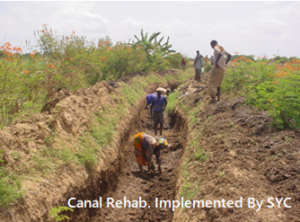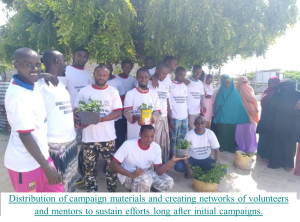 The immediate consequences of climate change have had a disproportionate impact on the youth of Somalia. Changes in weather patterns have resulted in heavy rains and flooding, thereby endangering the livelihoods and future of Somali youth.
The immediate consequences of climate change have had a disproportionate impact on the youth of Somalia. Changes in weather patterns have resulted in heavy rains and flooding, thereby endangering the livelihoods and future of Somali youth.
Addressing these challenges requires multiple approaches, including empowering Somali youth with education and awareness of climate change, investing in climate change adaptation measures, improving infrastructure resilience, and building entrepreneurship skills for Local youth in Somalia.
Somali Youth Concern, a youth-based organization in Somalia has been implementing climate change awareness activities in Southern Somalia where the effects of the lengthy droughts and environmentally destructive human activities have impacted lives and livelihoods. The impact of climate change means the once flourishing region of abundant flora and fauna may soon be reduced to a simmering desert. Local administration, community, and youth have all been involved in activities that included awareness raising, tree and nursery planting and establishment, distribution of campaign materials, and creating networks of volunteers and mentors to sustain efforts long after initial campaigns.
 Somali Youth Concern is a local youth organization working in Somalia for over two decades since its establishment in 2002. The idea of the organizational foundation was first initiated by a group of Somali youth intellectuals, both men and women and the Somali community in Diaspora. The vision of the organisation is to be a dynamic and inclusive organization that alleviates youth suffering in Somalia and beyond.
Somali Youth Concern is a local youth organization working in Somalia for over two decades since its establishment in 2002. The idea of the organizational foundation was first initiated by a group of Somali youth intellectuals, both men and women and the Somali community in Diaspora. The vision of the organisation is to be a dynamic and inclusive organization that alleviates youth suffering in Somalia and beyond.
Philanthropists can play an important role in mitigating the impact of climate change by empowering young people/youth with education and awareness that can help them become advocates for sustainable practices and resilient communities.
One such example is income distribution programs targeted at youth and other vulnerable communities. Such programs would help to minimize the negative coping strategies of climate change, for example the cutting down of trees for commercial charcoal production. Other distribution programs are those that teach sustainable fishing, farming, and honey production.
Philanthropists can help by funding the already initiated activities through support to the local organizations to further reach more people with awareness messages on climate change and the most effective ways to mitigate these challenges. This could include enhancing the climate change adaptive capacity of smallholder farmer communities in Somalia.
Health risks are another concern. Climate change, especially the heavy rains in the country, have led to increased health risks for young people. Contaminated water sources, inadequate sanitation, and the spread of water borne diseases like cholera have become more prevalent and the youth are particularly vulnerable to these diseases.
The youth, especially those living in low-income communities, may have limited capacity to cope with and recover from climate-related events. This could lead to a higher likelihood of long-term negative impacts on the youth, and this might leave a negative impact on their development.
Mental health is another concern. Climate related events like the flooding and heavy rains have caused psychological unrest among the youth. They have experienced fear, anxiety, and trauma due to the loss of their belongings, displacement and the destruction caused by the floods and the heavy moving water in their respective locations. These mental health impacts can affect their overall academic and professional well-being as their few belongings are carried away.
Flooding and the heavy rains in many parts of the country have damaged infrastructure & other modes of transport and this made it difficult for the youth to access education, healthcare and employment opportunities. This has led to reduced income for families relying on their youth as accessibility is hindered.
Capacity Building and Skills Development:
Philanthropy can enhance the skills and capabilities of young people to address climate change challenges.
 This could include funding for vocational training and environmental protection by equipping the youth with the necessary knowledge and skills. Donors can empower them to become effective agents of change in combating climate change.
This could include funding for vocational training and environmental protection by equipping the youth with the necessary knowledge and skills. Donors can empower them to become effective agents of change in combating climate change.
Philanthropic organisations can also facilitate collaboration and partnerships among various stakeholders, including youth-led organizations. Collaborative projects could focus on areas such as climate resilience, sustainable development, and fostering innovation for climate solutions.
The flooding and heavy rains in the country, especially in the Gedo and Hiran regions of Somalia, have resulted in the displacement of families. The youth are often the most affected by those displacements as they have lost access to their homes, schools and community gatherings. Faced with the challenges of climate change, philanthropy has an opportunity to help Somali youth gain skills to help them cope with the immediate impact of their displacement and empower them to help create a better future.
Abdinajib Hassan is the programme manager at Somali Youth Concern



Comments (0)